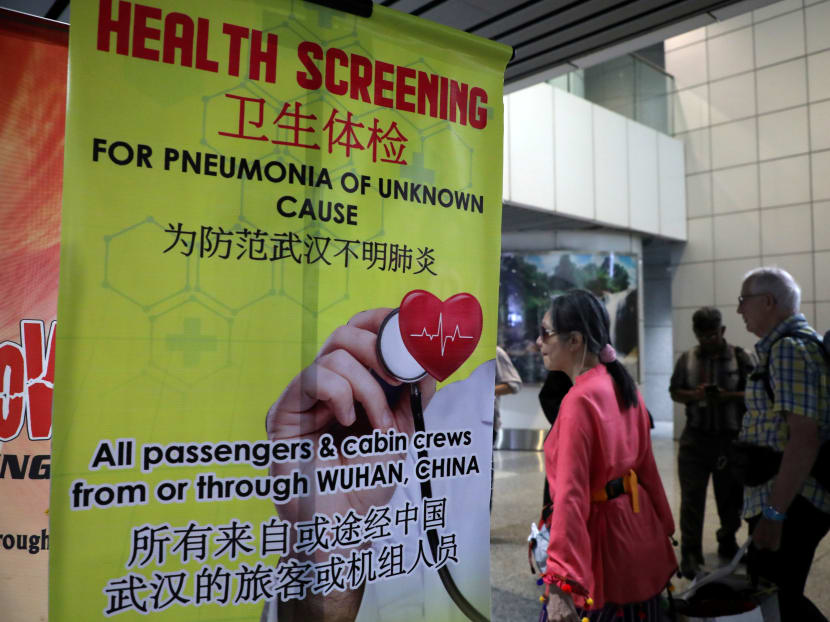China’s credibility on the line as it tries to dispels fears it will cover up spread of Wuhan virus
HONG KONG — As medical practitioners race against time to contain the spread of the new coronavirus from the central Chinese city of Wuhan, the country’s leaders have a second battle to fight — defending its credibility in the face of widespread scepticism about its commitment to transparency.

Passengers pass a banner about Wuhan Pneumonia at a thermal screening point in the international arrival terminal of Kuala Lumpur International Airport in Sepang, Malaysia, Jan 21, 2020.
HONG KONG — As medical practitioners race against time to contain the spread of the new coronavirus from the central Chinese city of Wuhan, the country’s leaders have a second battle to fight — defending its credibility in the face of widespread scepticism about its commitment to transparency.
The outbreak, which had infected more than 300 people across China and around half a dozen overseas by Tuesday (Jan 21) evening, apparently originated from a seafood market. So far, at least six people in Wuhan have died because of the virus.
It is believed to be less contagious than severe acute respiratory syndrome, which killed more than 700 people worldwide.
But China’s poor handling of that outbreak in 2002 and 2003 — which was marked by cover-ups and an official reluctance to share information — has prompted sceptics to ask whether Beijing would again put politics ahead of protecting public health.
Mr Peter Cordingley, who was the spokesman for World Health Organisation during the Sars crisis, was one of those who raised the alarm on social media on Tuesday accusing Beijing of “lying about the spread of the Wuhan flu virus from the start”.
“I say this because I was the WHO spokesman in Asia at the time of the 2003 Sars outbreak, and I’m seeing precisely the same reckless behaviour now,” he wrote.
Aware of the widespread scepticism it faces, Beijing has moved fast to assure the international community and the public that it will not tolerate any cover up or withholding of sensitive information about the outbreak.
On Tuesday the Central Political and Legal Affairs Commission — Beijing’s top political body responsible for law and order — ran a social media commentary telling Communist Party officials not to forget the painful lessons of Sars and to ensure timely reporting of the current situation.
“Anyone who puts the face of politicians before the interests of the people will be the sinner of a millennium to the party and the people,” the commentary on its Chang An Jian account read.
“Anyone who deliberately delays and hides the reporting of [virus] cases out of his or her own self-interest will be nailed on the pillar of shame for eternity,” it added.
The commentary cited an instruction issued by Chinese President Xi Jinping on Monday that the virus must be “resolutely contained” and that all cadres must make “the safety of people’s lives and their physical health” the top priority.
It stressed that transparency remained the best defence against rumours and public panic.
“Only by making information public can [we] reduce fear,” it said. “People don’t live in a vacuum and [we] will only provide a breeding ground for rumours to grow if we keep them in the dark and strip them of their right to the truth.”
When asked by reporters on Monday, China's Foreign Ministry spokesman Geng Shuang also stressed that China was taking a “responsible attitude” in handling the latest outbreak from Wuhan and said it was willing to share information with foreign countries and regions.
In an online commentary, Mr Hu Xijin, editor of Global Times, a tabloid affiliate of People’s Daily, criticised the Wuhan municipal government for its sluggish response to the crisis.
Mr Hu even questioned if the Wuhan authorities would have been willing to take the responsibility for confirming the probable human-to-human transmission of the virus had it not been revealed by Mr Zhong Nanshan, one of China’s leading experts on respiratory diseases, on Monday.
Mr Wu Qiang, a Beijing-based political analyst and former Tsinghua University professor, said Wuhan’s slow response may have been due to an ingrained culture among Communist Party cadres who were not prepared to act on their own.
“All these campaigns that have been launched one after another since Xi Jinping came to power seven years ago have robbed cadres of the motivation to take the initiative and they have become accustomed to hiding behind the shadow of the strong man,” Mr Wu said.
He added that Beijing’s tight control over free speech and intellectuals has also created a stifled environment discouraging experts to speak out during a public health crisis.
Mr Steve Tsang, director of the China Institute at the University of London’s School of Oriental and African Studies, said local officials were apprehensive about taking sensible preventive measures without knowing what Xi and other top leaders wanted as they feared that any missteps would have serious political consequences.
“Who would dare to take on this responsibility without knowing whatever action to be taken would enjoy Xi’s blessings? So, I can’t say I was surprised by the basically passive responses until Xi came out ordering a robust response,” Mr Tsang said.
He said the problem was not a specific Chinese cultural issue but a systemic problem commonly seen in countries where “power is concentrated in the hands of one top leader who is punitive to those who make mistakes”.
“All important and sensitive issues will have to be decided by the top leader,” he said.
Professor Gabriel Leung, founding director of the University of Hong Kong’s WHO Collaborating Centre for Infectious Disease Epidemiology and Control, said on Tuesday that politics should not be a factor in cases such as this.
“Science and epidemic control should not be linked with politics,” Mr Leung said. “If any places linked epidemic control measures... with other considerations including politics, there would definitely be a problem.” SOUTH CHINA MORNING POST






